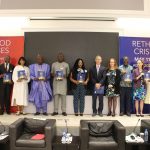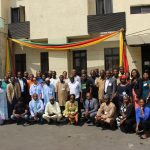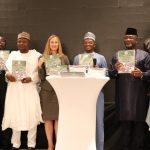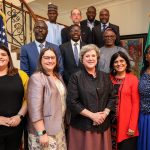By: Omobolanle Onilogbo, Adetunji Fasoranti, Lucia Carillo, Katrina Kosec, Kwaw Andam, Hyacinth Edeh, and Evgeniya Anisimova View the Nigeria launch event page here! On May 11, 2023, the Abuja office of the International Food Policy Research Institute (IFPRI Nigeria) and the CGIAR Research Initiative on Fragility, Conflict, and Migration (FCM) co-hosted a hybrid event featuring […]
IFPRI’s 2023 Global Food Policy Report & CGIAR Research Initiative on Fragility, Conflict & Migration (FCM) Nigeria Event Launch
Special Event Rethinking Food Crisis Responses The Nigeria presentation of IFPRI's 2023 Global Food Policy Report & the launch of the CGIAR Research Initiative on Fragility, Conflict & Migration (FCM) Thursday, May 11, 2023 / 10:00 AM – 1:45 PM Nigeria Time In-person participation: Ballroom, Fraser Suites, 294 Leventis Close, CBD, Abuja, Nigeria Live […]
Rethinking Food Markets Initiative: Stakeholders workshop in Nigeria
The CGIAR Initiative on 'Rethinking Food Markets[1]', led by the International Food Policy Research Institute (IFPRI), organized a two-day (12-13 Dec. 2022) stakeholders workshop in Abuja, Nigeria. The workshop aims to engage with key stakeholders to kick-start the co-designing of innovations and interventions in 'Food Markets and Value Chains' to enhance employment opportunities and […]
Launch of the National Agriculture Technology and Innovation Policy (NATIP) 2022-2027
26 August 2022 marked an important day for the Nigerian agricultural sector as the Federal Ministry of Agriculture and Rural Development (FMARD) launched a new agriculture policy called the National Agricultural Technology and Innovation Policy (NATIP) in the nation's Federal Capital Territory (FCT) to provide a roadmap for the transformation of the agri-food systems in […]
Roundtable Discussion on Food Security in Nigeria with US Ambassador to Nigeria
On August 3, 2022, the U.S. Ambassador to Nigeria, Mary Beth Leonard, invited food security experts, including Kwaw Andam, IFPRI’s Nigeria Program Leader, to a roundtable discussion on the food situation in Nigeria. Other participants included representatives from the United States Agency for International Development (USAID)/Nigeria, United Nations Children's Fund (UNICEF), World Food Programme, the Nigerian Institute of Social and Economic Research (NISER), the Nigerian Agribusiness Group (NABG), and a Mandela Washington Fellow.
- « Previous Page
- 1
- …
- 3
- 4
- 5
- 6
- 7
- Next Page »






